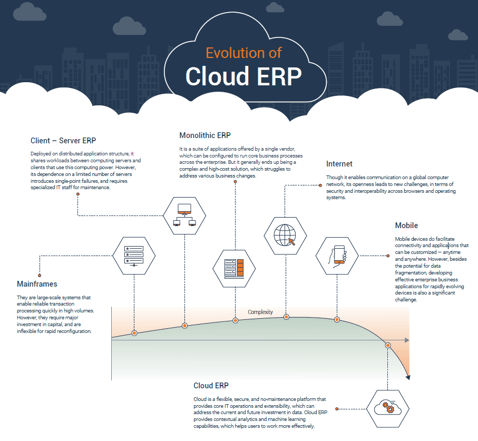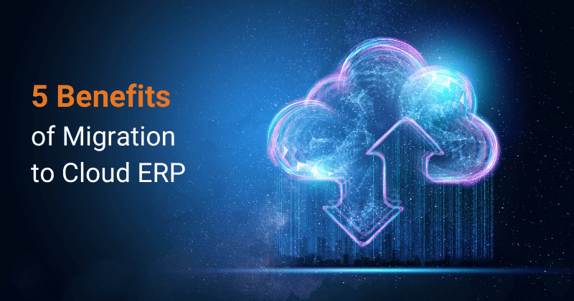Various technology specialists define the term “Enterprise Resource Planning (ERP)” differently. What’s more … depending on several factors, no two ERP implementations may exactly be the same. However, what most experts will still agree with, is the fact that ERP has evolved as reliable software systems that help companies to not just effectively manage processes, including rental, services, and core supply chain, but also various core activities, such as accounting and procurement, customer relationship management, compliance, and risk management.
And with everyone talking about the cloud these days, the big question is about why it is critical for ERP to migrate to cloud, and when is the right time for the companies to do it. But before we get there, to begin with, it may help to know the key challenges and opportunities that have helped us arrive at Cloud ERP. Below is a quick representation of the evolution that has spanned several exciting years in technology, and brought about significant reduction in complexity:
For instance, if a customer wants to learn how to maximize the productivity of the complicated machinery they have rented, they can access the information through the equipment rental portal. Or if they want to return the equipment before the end of the rental period, they can find information about the charges due.
Let’s take a look at the role an equipment rental portal can play in streamlining the way your company interacts with customers.

Click on the image to view the infographic in full size
What is driving the organizations to seek cloud adoption for ERP?
The recent market and customer trends and demands have been creating constant pressure for companies to deliver faster, and possess eminent agility to respond to new challenges and opportunities as well. Most companies now understand that to stay on top of their game and have a competitive edge, they will need to leverage state-of-the-art technology that can shape the future of their customers. They have realized that cloud adoption not only provides them with a valuable platform to take advantage of the current trends, but also helps them improve the overall experience for their customers — whether it is about optimizing costs and efficiency, growing faster, or succeeding in their respective endeavors.
The role of connectivity, automation, & Artificial Intelligence (AI)
We are currently in the third wave of digitization. While the first wave was about making information available via the internet, the second focused primarily on making it available at any time and from anywhere — via smart phones and devices. And the third wave is about leveraging connectivity, automation, and artificial intelligence effectively, which is not possible without the optimization of data. So, the third wave seeks the benefits of cloud to be successful, as it simplifies ERP and makes it more effective.
How cloud ERP will benefit companies and their customers?
While there are various substantial benefits, let us take a look at some of the most distinct and critical advantages that delight the companies, as they migrate to cloud.

Focus better and excel with the flexibility offered by cloud innovations
With cloud, it’s not just about leveraging minimal resources — most cloud vendors are proactively coming up with new ways and adopting new trends on how their resources could be used optimally and billed to the companies. As and when they perform their upgrade cycles, the companies too can seek added benefits from the improved resources. And for this, the companies will only need to pay their monthly enhancement fees, and allow this expenditure to be recognized as operational costs, instead of having to request for approvals for long-term capital expenses.
So, with improved manageability, reduced internal resources for hardware support, and scalable processes, companies can now focus primarily on their priorities, core competencies, and objectives, instead of having to manage data centers.
Security and maintenance of proper governance is no longer a key concern
Until now, many companies have had to run their own data centers to be able to control security and governance of their data and assets. However, the cloud vendors have started to deliver more effective solutions that render higher security and governance than what the companies can provide on their own. Moreover, cloud vendors are constantly investing on their security features, new patterns, government compliance requirements, and various other aspects — so, companies can rely on the vendors and benefit from their scale of operations and expertise.
Optimize operational efficiencies and costs
Over the years, companies have had to invest in the procurement of expensive hardware, to keep up with the increasing demands for real-time responses and various market trends. They have had to make these exorbitant decisions, with no significant assurances about returns on investment. However, cloud computing helps companies derive cost benefits of being agile. They can now start with limited resources in the beginning, and then scale up or down, primarily based on their business requirements.
Scale up or down seamlessly and effectively
One of the key challenges that every organization faces is the lead time that they require in deploying hardware, which addresses ever-changing demands of users. This may sometimes result in the extension of project timelines or increasing their unpredictability quotient. This can be easily addressed with the cloud vendor providing virtual limitless capacity and the ability to use that capacity based on the organization’s utilization. Besides not having to incur maintenance costs, companies can now only pay for the resources they use. Resources can be scaled up exponentially with growing demands and scaled down, when they are being under-utilized.
Uncomplicated expansion of operations in different regions and zones
For most companies, growth and expansion of global operations are some of the leading priorities, as they aspire to serve more customers. But this expansion requires major investments, as more data centers may be needed. Deployment and maintenance of data centers is a risky proposition, especially when the expansion is outside of traditional markets or in a new location. However, with cloud, the companies can achieve the desired goals, and with optimal investments. What’s more … these days, most of the cloud providers have operations in such locations that are conducive to helping their customers expand — in any region or country and at any time!
Is Migration to cloud ERP relevant for you? If yes, what’s next?
If some or all the above benefits resonate with you or even if you wish to know more about “migration to cloud ERP,” then our specialists at To-Increase can help you move the needle in this pursuit. Together, we can explore the potential for your organization to leverage the benefits of cloud migration to help you gain competitive advantage.




